One of the finest online places to read original and always well-written reviews of old and new films is Bunched Undies. On 1 February this year, host David Anderson selected especially for EFSP twelve of his favourite European films, which were all produced before for 1960. And of course, we also wanted to know what he liked after 1960. So click on the film titles below for David's reviews of the films. The postcards all come from Truus, Bob & Jan Too! at Flickr, and the video clips from YouTube.
Red Desert (1964)
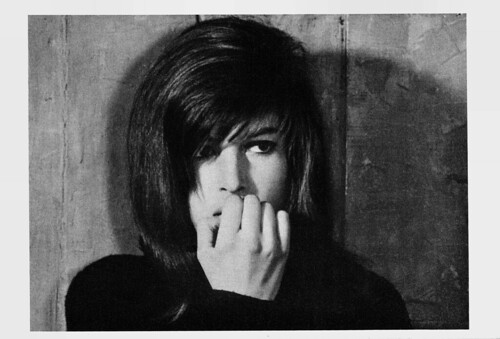
French postcard by Editions La Malibran, Paris, no CI 3. Photo: Carlo di Palma. Publicity still for Il desero rosso/Red Desert (Michelangelo Antonioni, 1964).
David Anderson: “Presented as a succession of set pieces, the film begins with a dazed Monica Vitti wandering along the perimeter of a gigantic power plant. Accompanied by her son (Valerio Bartoleschi), Vitti trudges through a toxic and barren landscape.”
The Battle of Algiers (1966)
Scene from La battaglia di Algeri/The Battle Of Algiers (Gillo Pontecorvo, 1966). Source: Gahru Mar (YouTube).
“When a group of disaffected young men led by Ali (Brahim Hadjadj) begin a series of random shootings of police officers, their campaign of terror rapidly escalates. Eventually, a highly decorated French colonel with a reputation for ruthlessness (Jean Martin) is brought in the quell the violence, and all hell breaks loose.”
Kes (1969)
Scene from Kes (Ken Loach, 1969). Source: JoeDnufc4life (YouTube).
“Kes is short for kestrel, a type of falcon common in the UK, and out of the blighted potty-mouth of young Billy Casper (David Bradley), it’s a term of endearment in this story of an unlikely friendship between a bird of prey and a victim of industrial society.”
The Spirit of the Beehive (1973)
Trailer for El espíritu de la colmena/The Spirit of the Beehive (Victor Erice, 1973). Source: Robert Marshall (YouTube).
“One day a battered delivery van arrives at the town’s makeshift cinema bearing a print of Frankenstein, James Whale’s monster epic from 1931. Among the excited villagers in attendance are seven year-old Ana (Ana Torrent) and her sister Isabel (Isabel Telleria). But what should be an evening’s light entertainment has a profound effect on young Ana, eventually leading her to an existential crisis.”
Family Nest (1979)
Scene from Családi tűzfésze/Family Nest (Bela Tarr, 1979). Source: Mulhollnd (YouTube).
“Family patriarch Gabor Kun – in an amazing performance – holds court at his family’s tiny kitchen table, and loudly issues ill-formed opinions on everything from the virtues of watery soup to the deficient child rearing abilities of his long suffering daughter-in-law Irén (Laszlone Horvath). “
Stalker (1979)
Trailer for Сталкер/Stalker (1979). Source: bioreflex (YouTube).
“With access to the Zone forbidden by the authorities, shadowy men known as Stalkers act as guides for those with the determination - and the money - to risk an expedition into this secret Shangri-La. With a writer (Anatoliy Solonitsyn) and a professor (Nikolay Grinko) in tow, one such grim faced Stalker (Aleksandr Kaydanovskiy) heads out on a drizzly dawn to lead a furtive walk into the unknown.”
Pauline at the Beach (1983)
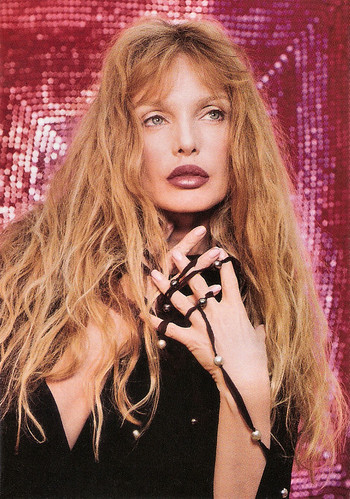
Arielle Dombasle. French postcard by Equilibres et Populations, Paris. Photo: Jean-Daniel Lorieux, 2003.
“Eric Rohmer's commentary on the perils of summer romances starts with the opening of a gate, as recent divorcee Marion (Arielle Dombasle) and her 14 year old cousin Pauline (Amanda Langlet) escape Paris for a brief holiday - brief by French standards anyway - at the shore near Mont Saint-Michelle.”
My Life as a Dog (1985)
Trailer Mitt liv som hund/My Life as a Dog (Lasse Halström, 1985). Source: Blondinka Inoz (YouTube).
“When Ingmar’s mother is stricken with tuberculosis, he is sent to the rural community of Emmaboda to live with his lively and eccentric uncle (Tomas von Brömssen). For one magical summer, amid a gallimaufry of rustic goofballs, Ingemar rediscovers the joys of childhood and thanks to a budding - in all senses of the word - tomboy named Saga (Melinda Kinnaman), he learns that growing up has its advantages too.”
Jean de Florette (1986)
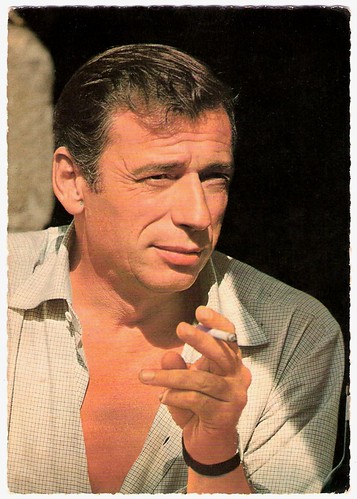
Yves Montand. German postcard by Krüger, no. 902/394. Photo: Gerard Decaux.
“Claude Berri’s Jean de Florette is part one of a sprawling Shakespearean-style tragedy; a multi-generational tale of parched, flinty soils and equally barren human souls. Set in the blinding sunlight of Provence circa 1920, it’s the story of the last surviving members of the Sobeyran family (Yves Montand, Daniel Auteuil), a once flourishing clan laid low by decades of petty squabbles and shady dealings.”
Babette's Feast (1987)
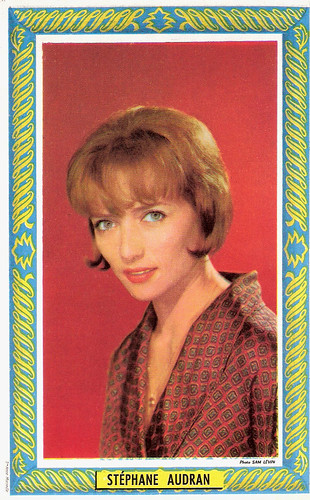
Stephane Audran. French postcard by St. Anne, Marseille. Photo: Sam Lévin.
“Like all good fairy tales, Babette’s Feast has a moral. Actually it has several morals, some obvious, some buried in subtext. It’s an example of film as palimpsest; charming and engaging on its rustic surface, but laden with deep veins of meaning and nuggets of existential truth for those willing to unearth them.”
The Double Life of Veronique (1991)
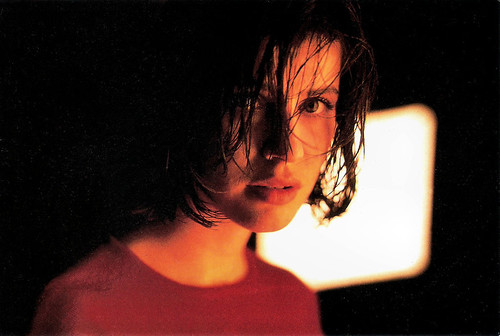
Irene Jacob. British postcard by Articificial Eye for the video release of |Trois couleurs: Rouge/Three Colours Red (Krzysztof Kieslowski, 1994).
Appropriately, The Double Life of Veronique is actually two films in one. The first act deals with a young woman in Poland (Irene Jacob) who has just gotten a big break in her fledgling career as a classical singer. One day on the cobblestone streets of Krakow, she spots a French tourist (Jacob in a double role) who could be her identical twin, setting off a chain of heartbreaking events.
I Can No Longer Hear the Guitar (1991)
Scene from J'entends plus la guitare/I Can No Longer Hear the Guitar (Philippe Garrel, 1991). Source: Boris Varissa (YouTube).
“Gerard (Benoit Regent) is completely captivated by Marianne (Johanna ter Steege) who is beautiful, bewitching and 100 lbs. of trouble. Since neither one really trusts the notion of happiness, their brief interludes of domestic bliss cause a slow-simmering panic in each of them, because, to paraphrase their friend Martin (Yann Collette): the worst part of happiness is being afraid you’ll lose it.”
Rosetta (1999)
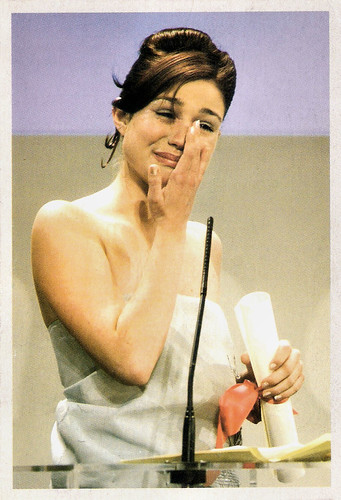
Belgian postcard by Ed. resp. P. Hurbain, Bruxelles, no. 148. Photo: Laurent Rebours / AP. Caption: Cannes 1999: Rosetta, the film by the Dardenne brothers, receives the Grand Prix, and Émilie Dequenne wins the award for Best Actress.
“Dequenne won the best actress award at Cannes for this performance, and her ability to lose herself in the film’s swirling maelstrom, usually with a camera lens just inches from her face, required confidence and skill far beyond her years. Her stunning work in Rosetta is nothing short of a revelation.”
Great, interesting choices! David, thank you very much.
Red Desert (1964)

French postcard by Editions La Malibran, Paris, no CI 3. Photo: Carlo di Palma. Publicity still for Il desero rosso/Red Desert (Michelangelo Antonioni, 1964).
David Anderson: “Presented as a succession of set pieces, the film begins with a dazed Monica Vitti wandering along the perimeter of a gigantic power plant. Accompanied by her son (Valerio Bartoleschi), Vitti trudges through a toxic and barren landscape.”
The Battle of Algiers (1966)
Scene from La battaglia di Algeri/The Battle Of Algiers (Gillo Pontecorvo, 1966). Source: Gahru Mar (YouTube).
“When a group of disaffected young men led by Ali (Brahim Hadjadj) begin a series of random shootings of police officers, their campaign of terror rapidly escalates. Eventually, a highly decorated French colonel with a reputation for ruthlessness (Jean Martin) is brought in the quell the violence, and all hell breaks loose.”
Kes (1969)
Scene from Kes (Ken Loach, 1969). Source: JoeDnufc4life (YouTube).
“Kes is short for kestrel, a type of falcon common in the UK, and out of the blighted potty-mouth of young Billy Casper (David Bradley), it’s a term of endearment in this story of an unlikely friendship between a bird of prey and a victim of industrial society.”
The Spirit of the Beehive (1973)
Trailer for El espíritu de la colmena/The Spirit of the Beehive (Victor Erice, 1973). Source: Robert Marshall (YouTube).
“One day a battered delivery van arrives at the town’s makeshift cinema bearing a print of Frankenstein, James Whale’s monster epic from 1931. Among the excited villagers in attendance are seven year-old Ana (Ana Torrent) and her sister Isabel (Isabel Telleria). But what should be an evening’s light entertainment has a profound effect on young Ana, eventually leading her to an existential crisis.”
Family Nest (1979)
Scene from Családi tűzfésze/Family Nest (Bela Tarr, 1979). Source: Mulhollnd (YouTube).
“Family patriarch Gabor Kun – in an amazing performance – holds court at his family’s tiny kitchen table, and loudly issues ill-formed opinions on everything from the virtues of watery soup to the deficient child rearing abilities of his long suffering daughter-in-law Irén (Laszlone Horvath). “
Stalker (1979)
Trailer for Сталкер/Stalker (1979). Source: bioreflex (YouTube).
“With access to the Zone forbidden by the authorities, shadowy men known as Stalkers act as guides for those with the determination - and the money - to risk an expedition into this secret Shangri-La. With a writer (Anatoliy Solonitsyn) and a professor (Nikolay Grinko) in tow, one such grim faced Stalker (Aleksandr Kaydanovskiy) heads out on a drizzly dawn to lead a furtive walk into the unknown.”
Pauline at the Beach (1983)

Arielle Dombasle. French postcard by Equilibres et Populations, Paris. Photo: Jean-Daniel Lorieux, 2003.
“Eric Rohmer's commentary on the perils of summer romances starts with the opening of a gate, as recent divorcee Marion (Arielle Dombasle) and her 14 year old cousin Pauline (Amanda Langlet) escape Paris for a brief holiday - brief by French standards anyway - at the shore near Mont Saint-Michelle.”
My Life as a Dog (1985)
Trailer Mitt liv som hund/My Life as a Dog (Lasse Halström, 1985). Source: Blondinka Inoz (YouTube).
“When Ingmar’s mother is stricken with tuberculosis, he is sent to the rural community of Emmaboda to live with his lively and eccentric uncle (Tomas von Brömssen). For one magical summer, amid a gallimaufry of rustic goofballs, Ingemar rediscovers the joys of childhood and thanks to a budding - in all senses of the word - tomboy named Saga (Melinda Kinnaman), he learns that growing up has its advantages too.”
Jean de Florette (1986)

Yves Montand. German postcard by Krüger, no. 902/394. Photo: Gerard Decaux.
“Claude Berri’s Jean de Florette is part one of a sprawling Shakespearean-style tragedy; a multi-generational tale of parched, flinty soils and equally barren human souls. Set in the blinding sunlight of Provence circa 1920, it’s the story of the last surviving members of the Sobeyran family (Yves Montand, Daniel Auteuil), a once flourishing clan laid low by decades of petty squabbles and shady dealings.”
Babette's Feast (1987)

Stephane Audran. French postcard by St. Anne, Marseille. Photo: Sam Lévin.
“Like all good fairy tales, Babette’s Feast has a moral. Actually it has several morals, some obvious, some buried in subtext. It’s an example of film as palimpsest; charming and engaging on its rustic surface, but laden with deep veins of meaning and nuggets of existential truth for those willing to unearth them.”
The Double Life of Veronique (1991)

Irene Jacob. British postcard by Articificial Eye for the video release of |Trois couleurs: Rouge/Three Colours Red (Krzysztof Kieslowski, 1994).
Appropriately, The Double Life of Veronique is actually two films in one. The first act deals with a young woman in Poland (Irene Jacob) who has just gotten a big break in her fledgling career as a classical singer. One day on the cobblestone streets of Krakow, she spots a French tourist (Jacob in a double role) who could be her identical twin, setting off a chain of heartbreaking events.
I Can No Longer Hear the Guitar (1991)
Scene from J'entends plus la guitare/I Can No Longer Hear the Guitar (Philippe Garrel, 1991). Source: Boris Varissa (YouTube).
“Gerard (Benoit Regent) is completely captivated by Marianne (Johanna ter Steege) who is beautiful, bewitching and 100 lbs. of trouble. Since neither one really trusts the notion of happiness, their brief interludes of domestic bliss cause a slow-simmering panic in each of them, because, to paraphrase their friend Martin (Yann Collette): the worst part of happiness is being afraid you’ll lose it.”
Rosetta (1999)

Belgian postcard by Ed. resp. P. Hurbain, Bruxelles, no. 148. Photo: Laurent Rebours / AP. Caption: Cannes 1999: Rosetta, the film by the Dardenne brothers, receives the Grand Prix, and Émilie Dequenne wins the award for Best Actress.
“Dequenne won the best actress award at Cannes for this performance, and her ability to lose herself in the film’s swirling maelstrom, usually with a camera lens just inches from her face, required confidence and skill far beyond her years. Her stunning work in Rosetta is nothing short of a revelation.”
Great, interesting choices! David, thank you very much.
No comments:
Post a Comment